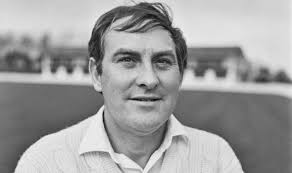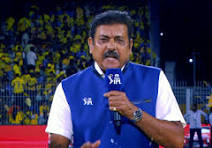Rajat Subhra Chatterjee
0019
On the Boxing Day, 2021, two Test matches start at two hemispheres of this globe. While India takes on a woefully depleted and weak South Africa at the Centurion Park in the first Test looking for their first ever Test series win in South Africa, England takes on Australia at the MCG in the 3rd Test to remain alive in the series, having lost the first two against perhaps now the best Test playing team. However, on this day we mourn the sad demise of Reymond Illingworth on the Christmas Day, ’21 as this is the 50th year that English cricket was taken to a new height by Illingworth for a stupendous Ashes series win 2-0 down under deploying utterly aggressive pace bowling supported by superlative batting performances from Boycott, Luckhurst and Edrich throughout the series.
50 years back, the Test match scheduled at the MCG was washed out for poor weather. As a single ball could not be bowled in the entire Test, it was agreed between the two teams to play a limited over match and when it took place it became a part of the history as it remains the very first one day International cricket match between two countries.
As Ray Illingworth is now part of the history of cricket, one can not forget his huge contribution towards English cricket in particular and to International cricket in general. The Momentous Series of 1970–71 in Australia was pivotal in cricket history and essentially ushered in the modern period of Test cricket. Before we come back on Illingworth, lets have a look of the specialities that this particular series had offered.
While, Rodney Marsh, Greg Chappell, Dennis Lillee, Terry Jenner, Alan Thomson, Kerry O’Keeffe, Ross Duncan, Ken Eastwood and Tony Dell made their debuts for Australia, England brought in Bob Willis as replacement for injured fast bowler Alan Ward, Brian Luckhurst, Ken Shuttleworth and Peter Lever as new Test caps. This series saw the retirement of Bill Lawry and Garth McKenzie from the Australian team. This was the first time that Ian Chappell took over from Bill Lawry midway as the new Australian captain and would pave the way for a completely new era of cricket in Australia. Last but not the least, The WACA Ground in Perth saw its inaugural Test match, the first new venue in an Ashes Test since the Brisbane Cricket Ground at Gabba in 1928–29.
Unlike Mike Brearly, Raymond Illingworth was a cricketer and a Captain, worth his salt in the English side. Perhaps the shrewdest ever captain of England and polished craftsman, ‘Illy’ was the darling of his team mates wherever he had played and captained, in spite of the fact that he was from Yorkshire. He was ‘tough, combative, grudging, shrewd, and an instinctive reader of the game’.
Illy could easily have walked in to the England Test side merely on the strength of his bowling and batting abilities. He was a flawless off spinner with a relatively longish run up and a classic delivery. His shock ball was the off break, which used to float away to slips. He was a sound batsman, specially in a crisis. He was a very safe fielder, close to the wicket or away. Illingworth was one of the few players to have scored over 20,000 runs and captured over 2,000 wickets in First-Class cricket. Ray Illingworth, often being complimented for his man-management, is the fourth cricketer to be inducted in the Yorkshire Hall of Fame after Fred Trueman, Geoff Boycott, and Len Hutton.
As he took over England captaincy in 1969 from injured Colin Cowdrey. Illingworth enhanced his own form to a great extent that his team mates had no option but to respect their skipper to give off their best. Illingworth had that uncanny knack in finding the right man for the right position. Illingworth had baptism by fire under another Yorkshire-born captain – Brain Close during 1967 India tour when he figured his best bowling performance of 6/29 against India. If Brian Close was bolder, Ray Illingworth surely was shrewder as a Captain.
At Sydney in the 7th Test of the 1970–71 series, ( originally it was a 6-Test series but as the Third Test at Melbourne was washed out, a 7th Test was agreed ) it was Illingworth, despite the absence of his star batsman injured Geoff Boycott, still pressurized the Australians into capitulation and came up triumphant. England closed the series 2-0. It was pinnacle in the illustrious career of Captain Illingworth as Australia was slumped to a home series defeat after 16 years.
Greg Chappell would comment later on Illingworth’s team : “Ray Illingworth’s England side in 1970-71 was mentally the toughest English side I played against. Illingworth subjected us to a mental intimidation by aggressive field placing, and physical intimidation by constant use of his pace attack.”
Headingly, 1969. West Indies were 219/3, chasing 302 in the fourth innings. Illingworth made an inspired bowling change bringing on Underwood and immediately had Basil Butcher caught behind for 91. He continued with spin and pace from both ends and wickets started falling in regular intervals. He rotated Brown and Night – two of his fast bowlers at one end and continuing with Underwood at the other and finished the West Indies innings at 272 winning by 30 runs. In fact wickets fell that afternoon with just about every bowling change he made.
Equally applauded would be Illingworth’s brilliant tactics at Headingly in 1971. Pakistan needed only 231 to win – they were sailing towards victory with Sadiq Mohammad and Asif Iqbal in full command at 160–4. Illingworth, from nowhere called in Norman Gifford and immediately Alan Knott pulled off a miraculous stumping off Gifford and Asif was gone. Illingworth’s another bowling change resulted in another wicket –that of Sadiq – c&b by Basil D’Oliveira.
Illingworth captained England for five seasons (1969–1973) and during this period, England beat the West Indies 2–0 in 1969, won the Ashes in Australia in 1970–71, beat Pakistan in 1971, yet somehow lost to India in 1971 but then regrouped and held on to the Ashes in a tight series again in 1972 before eventually losing to a strong West Indies team in 1973.
Ray Illingworth may not be watching the trauma, the present England side is going through in Australia, but his days of triumphs will never be forgotten.
Featured Image : Courtesy Internet





